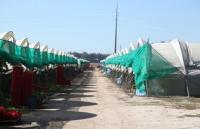 As night falls on São Teotónio, the lights are still on at the school. Three times a week, it stays open until midnight to hold classes for adults from the region, who come here at the end of a long day in the greenhouses – knowing they will need to speak some Portuguese in order to qualify for permanent residency. There are currently 500 adult students registered for night classes – almost matching the daytime intake of 600 children. Moldovan Vitali Siminionov, who picks flowers for a living, and whose two children both study at the school, joked: “They’re always correcting me saying ‘Dad, that’s not how you say it!”
As night falls on São Teotónio, the lights are still on at the school. Three times a week, it stays open until midnight to hold classes for adults from the region, who come here at the end of a long day in the greenhouses – knowing they will need to speak some Portuguese in order to qualify for permanent residency. There are currently 500 adult students registered for night classes – almost matching the daytime intake of 600 children. Moldovan Vitali Siminionov, who picks flowers for a living, and whose two children both study at the school, joked: “They’re always correcting me saying ‘Dad, that’s not how you say it!”
24.11.2020 | by Ana Naomi de Sousa
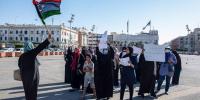 On March 23, at the outset of the pandemic, United Nations Secretary-General António Guterres called for a global ceasefire, in order to enable countries to focus on the COVID-19 crisis and allow humanitarian organizations to reach vulnerable populations. More than 100 women’s organizations from Iraq, Libya, Palestine, Syria, and Yemen quickly joined the appeal with a joint statement advocating a broad COVID-19 truce, which could form the basis for a lasting peace. It should come as no surprise that women were among the first to support the call for a ceasefire.
On March 23, at the outset of the pandemic, United Nations Secretary-General António Guterres called for a global ceasefire, in order to enable countries to focus on the COVID-19 crisis and allow humanitarian organizations to reach vulnerable populations. More than 100 women’s organizations from Iraq, Libya, Palestine, Syria, and Yemen quickly joined the appeal with a joint statement advocating a broad COVID-19 truce, which could form the basis for a lasting peace. It should come as no surprise that women were among the first to support the call for a ceasefire.
18.11.2020 | by Phumzile Mlambo-Ngcuka
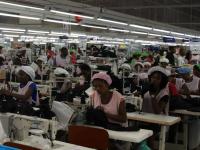 A Radical Journal of Geography, Global Displacements is a rigorous and trenchantly argued examination of the impact of the global organization of capitalist accumulation and exploitation on the life and labor of Haitian and Dominican people. Focusing on the garment industry, Werner looks at the circulation of capital and labor under neoliberalism, paying close attention to questions of geography, race, and gender. A critical, Caribbeanist intervention into geographic and political-economic research, Global Displacements will stand as a classic work of Caribbean studies.
A Radical Journal of Geography, Global Displacements is a rigorous and trenchantly argued examination of the impact of the global organization of capitalist accumulation and exploitation on the life and labor of Haitian and Dominican people. Focusing on the garment industry, Werner looks at the circulation of capital and labor under neoliberalism, paying close attention to questions of geography, race, and gender. A critical, Caribbeanist intervention into geographic and political-economic research, Global Displacements will stand as a classic work of Caribbean studies.
12.11.2020 | by The Public Archive and Marion Werner
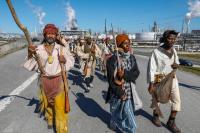 What if we accounted for all labor that was put in the development of those lands, both human, and non-human, the living, the inert, and the not-yet-lived, would this then lead us to a new understanding of its environment and its constitution as a disappearing geological strata in flux? Can we interpret how the energetic metabolism speculated around the Mississippi is withholding processes of land recuperation and human health, while privileging forms of dissolved property?
What if we accounted for all labor that was put in the development of those lands, both human, and non-human, the living, the inert, and the not-yet-lived, would this then lead us to a new understanding of its environment and its constitution as a disappearing geological strata in flux? Can we interpret how the energetic metabolism speculated around the Mississippi is withholding processes of land recuperation and human health, while privileging forms of dissolved property?
27.11.2019 | by Margarida Mendes
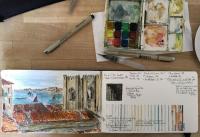 I imagine these as the “new navigators”, appropriating this controversial term to describe them in part because of their fearlessness, or perhaps more accurately their braving fear, in dis-covering, in the sense of recovering and uncovering, monstrous aspects of the past as a way to make sense of monstrous aspects of the present.
I imagine these as the “new navigators”, appropriating this controversial term to describe them in part because of their fearlessness, or perhaps more accurately their braving fear, in dis-covering, in the sense of recovering and uncovering, monstrous aspects of the past as a way to make sense of monstrous aspects of the present.
13.10.2019 | by Sharon Lubkemann Allen
 OUR SURVIVAL is at stake and the conditions and circumstances that are at our side are not just enough not enough and we have in a manner of ways been seeing this expressed in a diverse way on any given day on any given TV channel. There is an overall tension an almost thick layer of distrust, miscommunication, doubt, an insecurity that not only is taking place in the parliament of her magesty the queen but everywhere we consider to be touched by western values or whatever is left of them, such as Hong Kong is showing.
OUR SURVIVAL is at stake and the conditions and circumstances that are at our side are not just enough not enough and we have in a manner of ways been seeing this expressed in a diverse way on any given day on any given TV channel. There is an overall tension an almost thick layer of distrust, miscommunication, doubt, an insecurity that not only is taking place in the parliament of her magesty the queen but everywhere we consider to be touched by western values or whatever is left of them, such as Hong Kong is showing.
11.10.2019 | by Adin Manuel
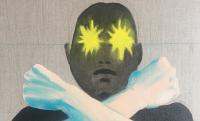 The mission of the EXCHANGE project (2015-2020) (2) is to reflect critically on the perpetuation of the “European dream” of a community of solidarity in which national, linguistic and cultural differences are overcome to produce a space in which citizens can move freely and safely. The surveillance technologies that the project studies have a shared feature: they are genetic machineries that seek to identify individuals for the purposes of criminal prosecution.
The mission of the EXCHANGE project (2015-2020) (2) is to reflect critically on the perpetuation of the “European dream” of a community of solidarity in which national, linguistic and cultural differences are overcome to produce a space in which citizens can move freely and safely. The surveillance technologies that the project studies have a shared feature: they are genetic machineries that seek to identify individuals for the purposes of criminal prosecution.
07.09.2019 | by Sheila Khan and Helena Machado
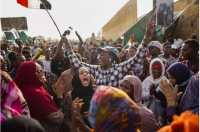 the so-called “international community”, which dedicated to the events in Sudan not even one-tenth of the attention given to the Venezuelan or Algerian crises, was awakened by the rumble of the fall of the dictator of Khartoum. It was as if Western, Arab and African governments understood suddenly that a democratic revolution in Sudan may have devastating effects on the stability of neighbouring countries and on the regional balance of power, entailing feverish political and diplomatic agitation.
the so-called “international community”, which dedicated to the events in Sudan not even one-tenth of the attention given to the Venezuelan or Algerian crises, was awakened by the rumble of the fall of the dictator of Khartoum. It was as if Western, Arab and African governments understood suddenly that a democratic revolution in Sudan may have devastating effects on the stability of neighbouring countries and on the regional balance of power, entailing feverish political and diplomatic agitation.
15.07.2019 | by Nicole Guardiola
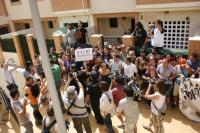 Politics isn’t, first and foremost, a matter of making allegations and raising awareness; there is no one straw that breaks the camel’s back, and what’s bad can be tolerated indefinitely. Instead, it is a sort of shedding of the skin, by which we become sensitive to this or allergic to that. Nor has it much to do with convincing (discourse), or seducing (marketing), but rather with opening all sorts of spaces to experience another way of living, another definition of reality, another vision of the world. In the struggle for hegemony, the skin – yours, mine, everyone’s – is the battlefield. JEUX SANS FRONTIÈRES #2
Politics isn’t, first and foremost, a matter of making allegations and raising awareness; there is no one straw that breaks the camel’s back, and what’s bad can be tolerated indefinitely. Instead, it is a sort of shedding of the skin, by which we become sensitive to this or allergic to that. Nor has it much to do with convincing (discourse), or seducing (marketing), but rather with opening all sorts of spaces to experience another way of living, another definition of reality, another vision of the world. In the struggle for hegemony, the skin – yours, mine, everyone’s – is the battlefield. JEUX SANS FRONTIÈRES #2
11.02.2018 | by Amador Fernández-Savater
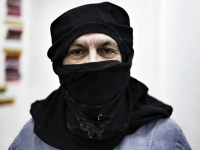 Lots of people are beginning to think about politics, learning how to think about the city, relations and institutions. There are people from all over the place, from universities, associations and schools. And the Government is feeling it, they fear our advances. But to say that popular uprisings in Brazil are brainless and devoid of focus is simplistic, because everything is focus. JEUX SANS FRONTIÈRES #2
Lots of people are beginning to think about politics, learning how to think about the city, relations and institutions. There are people from all over the place, from universities, associations and schools. And the Government is feeling it, they fear our advances. But to say that popular uprisings in Brazil are brainless and devoid of focus is simplistic, because everything is focus. JEUX SANS FRONTIÈRES #2
09.04.2016 | by
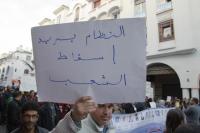 In Morocco, unlike other countries, despite the enormous popular support for the protests, which took place simultaneously in several cities on February 20, 2011, and that re-occurred sometimes on a weekly basis during that year, there were no calls (with some timid exceptions) based on the famous slogan “the people want the fall of the regime.” This would become a somewhat taboo slogan, either for fear of jeopardizing the monarchical regime, whose legitimacy is presented as being unquestionable, or by an apparently sincere devotion of a significant portion of the population towards the Moroccan monarchy. JSF#2
In Morocco, unlike other countries, despite the enormous popular support for the protests, which took place simultaneously in several cities on February 20, 2011, and that re-occurred sometimes on a weekly basis during that year, there were no calls (with some timid exceptions) based on the famous slogan “the people want the fall of the regime.” This would become a somewhat taboo slogan, either for fear of jeopardizing the monarchical regime, whose legitimacy is presented as being unquestionable, or by an apparently sincere devotion of a significant portion of the population towards the Moroccan monarchy. JSF#2
28.03.2016 | by Hugo Maia
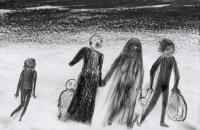 i would not be
i would not be had i not not i i too but not even at all if.
i would not be only not i i too i would not be. i am because. i am i too i because if.
i would not be if my mother had not met my father i naturally by the nature of things would not be i would not be.
i would not be
i would not be had i not not i i too but not even at all if.
i would not be only not i i too i would not be. i am because. i am i too i because if.
i would not be if my mother had not met my father i naturally by the nature of things would not be i would not be.
18.03.2016 | by Miriam Cahn
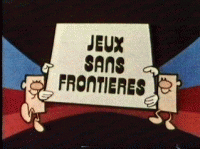 People are fighting today against growing poverty, against mutating forms of capitalist exploitation disguised and administered under the label of “austerity politics” in Europe and elsewhere. But to resist – r/esistere in a somewhat fictional etymology – also means to invent new modes of existence. To invent is not to create something out of nothing, but to aggregate forces that were already present – the invention in this sense is a recomposition of forces. MAGAZINE JSF#2
People are fighting today against growing poverty, against mutating forms of capitalist exploitation disguised and administered under the label of “austerity politics” in Europe and elsewhere. But to resist – r/esistere in a somewhat fictional etymology – also means to invent new modes of existence. To invent is not to create something out of nothing, but to aggregate forces that were already present – the invention in this sense is a recomposition of forces. MAGAZINE JSF#2
08.03.2016 | by Sandra Lang
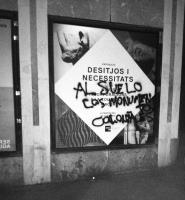 Decolonising a cultural institution does not just mean considering the matter and organising exhibitions and seminars. In the current context, decolonising a museum requires a constant effort to take a position in regard to the migratory control system; it requires accepting that it is impossible to continue programming activities and events while there is a total normalisation of the existence of Migrant Detention Centres, forced deportation flights on a mass and individual scale, individuals with semi-rights and anti-rights, and situations of extreme violence in border zones which are the local contexts where these projects are presented.
Decolonizing Museums, L'Internationale Online Issue 2, September 2015.
Decolonising a cultural institution does not just mean considering the matter and organising exhibitions and seminars. In the current context, decolonising a museum requires a constant effort to take a position in regard to the migratory control system; it requires accepting that it is impossible to continue programming activities and events while there is a total normalisation of the existence of Migrant Detention Centres, forced deportation flights on a mass and individual scale, individuals with semi-rights and anti-rights, and situations of extreme violence in border zones which are the local contexts where these projects are presented.
Decolonizing Museums, L'Internationale Online Issue 2, September 2015.
27.02.2016 | by Daniela Ortiz
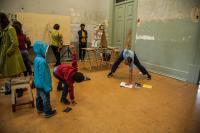 The subtitle of this issue works both ways: practices of resistance and spaces of invention, practices of invention and spaces of resistance. Even if we think in terms of productive power relations, we still use the word “resistance” in reference to those practices and spaces that emerge in moments of antagonist tension: e.g., when measures imposed by governmental institutions and the lack of perspectives for the future are individually and collectively felt as being oppressive.
The subtitle of this issue works both ways: practices of resistance and spaces of invention, practices of invention and spaces of resistance. Even if we think in terms of productive power relations, we still use the word “resistance” in reference to those practices and spaces that emerge in moments of antagonist tension: e.g., when measures imposed by governmental institutions and the lack of perspectives for the future are individually and collectively felt as being oppressive.
29.10.2015 | by vários
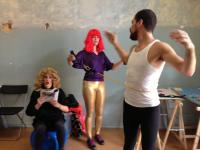 Is imperative to not look at recent events in a epiphenomenal way, focusing exclusively on the squares themselves, as if these events were “irrational”, came out of nowhere and went back to noplace (the very name “Arab Spring” seems to imply that the Spring is outside the historical time). We should instead try to understand them in continuity, alongside a myriad of encounters, practices, actions – that we call ’zones of resistance and practices of invention’.
Is imperative to not look at recent events in a epiphenomenal way, focusing exclusively on the squares themselves, as if these events were “irrational”, came out of nowhere and went back to noplace (the very name “Arab Spring” seems to imply that the Spring is outside the historical time). We should instead try to understand them in continuity, alongside a myriad of encounters, practices, actions – that we call ’zones of resistance and practices of invention’.
04.10.2013 | by Ana Bigotte Vieira
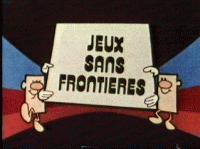 The border is understood here not as a groove, but as a program “whose operation invests and covers the whole set of social relations”; as a police force specialized in separating who is from who is not; as an operation permanently being reiterated in space, academic disciplines, knowledge, and in our own acts; as a line that crosses us all, and which it is important to talk about.
The border is understood here not as a groove, but as a program “whose operation invests and covers the whole set of social relations”; as a police force specialized in separating who is from who is not; as an operation permanently being reiterated in space, academic disciplines, knowledge, and in our own acts; as a line that crosses us all, and which it is important to talk about.
27.12.2012 | by Ana Bigotte Vieira
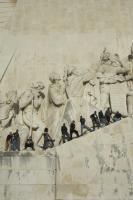 Lusosphere has a long way to go to become more interesting. If considered from the Portuguese standpoint, lusosphere reverberates the colonial past, people relate to and interest in the stories of each other more forcefully within the boundary of this "imagined community" that, despite this name, does not help them in living conditions and, if a Lusophone project exists, in most respects it has failed miserably.
Lusosphere has a long way to go to become more interesting. If considered from the Portuguese standpoint, lusosphere reverberates the colonial past, people relate to and interest in the stories of each other more forcefully within the boundary of this "imagined community" that, despite this name, does not help them in living conditions and, if a Lusophone project exists, in most respects it has failed miserably.
03.10.2011 | by Marta Lança
 From Melilla to Poland, Cypress to the Canaries, thousands of people daily attempt to leave their places of origin and reach the European continent in search of better living conditions, leaving behind the most varied settings – wars, fires, droughts, floods, repressive regimes, massive unemployment, poverty wages, fundamentalists – and confronting, everywhere, the same repressive strategy, the same barriers and persecution, the same racism and the same violence.
From Melilla to Poland, Cypress to the Canaries, thousands of people daily attempt to leave their places of origin and reach the European continent in search of better living conditions, leaving behind the most varied settings – wars, fires, droughts, floods, repressive regimes, massive unemployment, poverty wages, fundamentalists – and confronting, everywhere, the same repressive strategy, the same barriers and persecution, the same racism and the same violence.
09.09.2010 | by Ricardo Noronha
 As night falls on São Teotónio, the lights are still on at the school. Three times a week, it stays open until midnight to hold classes for adults from the region, who come here at the end of a long day in the greenhouses – knowing they will need to speak some Portuguese in order to qualify for permanent residency. There are currently 500 adult students registered for night classes – almost matching the daytime intake of 600 children. Moldovan Vitali Siminionov, who picks flowers for a living, and whose two children both study at the school, joked: “They’re always correcting me saying ‘Dad, that’s not how you say it!”
As night falls on São Teotónio, the lights are still on at the school. Three times a week, it stays open until midnight to hold classes for adults from the region, who come here at the end of a long day in the greenhouses – knowing they will need to speak some Portuguese in order to qualify for permanent residency. There are currently 500 adult students registered for night classes – almost matching the daytime intake of 600 children. Moldovan Vitali Siminionov, who picks flowers for a living, and whose two children both study at the school, joked: “They’re always correcting me saying ‘Dad, that’s not how you say it!”  On March 23, at the outset of the pandemic, United Nations Secretary-General António Guterres called for a global ceasefire, in order to enable countries to focus on the COVID-19 crisis and allow humanitarian organizations to reach vulnerable populations. More than 100 women’s organizations from Iraq, Libya, Palestine, Syria, and Yemen quickly joined the appeal with a joint statement advocating a broad COVID-19 truce, which could form the basis for a lasting peace. It should come as no surprise that women were among the first to support the call for a ceasefire.
On March 23, at the outset of the pandemic, United Nations Secretary-General António Guterres called for a global ceasefire, in order to enable countries to focus on the COVID-19 crisis and allow humanitarian organizations to reach vulnerable populations. More than 100 women’s organizations from Iraq, Libya, Palestine, Syria, and Yemen quickly joined the appeal with a joint statement advocating a broad COVID-19 truce, which could form the basis for a lasting peace. It should come as no surprise that women were among the first to support the call for a ceasefire.  A Radical Journal of Geography, Global Displacements is a rigorous and trenchantly argued examination of the impact of the global organization of capitalist accumulation and exploitation on the life and labor of Haitian and Dominican people. Focusing on the garment industry, Werner looks at the circulation of capital and labor under neoliberalism, paying close attention to questions of geography, race, and gender. A critical, Caribbeanist intervention into geographic and political-economic research, Global Displacements will stand as a classic work of Caribbean studies.
A Radical Journal of Geography, Global Displacements is a rigorous and trenchantly argued examination of the impact of the global organization of capitalist accumulation and exploitation on the life and labor of Haitian and Dominican people. Focusing on the garment industry, Werner looks at the circulation of capital and labor under neoliberalism, paying close attention to questions of geography, race, and gender. A critical, Caribbeanist intervention into geographic and political-economic research, Global Displacements will stand as a classic work of Caribbean studies.  What if we accounted for all labor that was put in the development of those lands, both human, and non-human, the living, the inert, and the not-yet-lived, would this then lead us to a new understanding of its environment and its constitution as a disappearing geological strata in flux? Can we interpret how the energetic metabolism speculated around the Mississippi is withholding processes of land recuperation and human health, while privileging forms of dissolved property?
What if we accounted for all labor that was put in the development of those lands, both human, and non-human, the living, the inert, and the not-yet-lived, would this then lead us to a new understanding of its environment and its constitution as a disappearing geological strata in flux? Can we interpret how the energetic metabolism speculated around the Mississippi is withholding processes of land recuperation and human health, while privileging forms of dissolved property?  I imagine these as the “new navigators”, appropriating this controversial term to describe them in part because of their fearlessness, or perhaps more accurately their braving fear, in dis-covering, in the sense of recovering and uncovering, monstrous aspects of the past as a way to make sense of monstrous aspects of the present.
I imagine these as the “new navigators”, appropriating this controversial term to describe them in part because of their fearlessness, or perhaps more accurately their braving fear, in dis-covering, in the sense of recovering and uncovering, monstrous aspects of the past as a way to make sense of monstrous aspects of the present.  OUR SURVIVAL is at stake and the conditions and circumstances that are at our side are not just enough not enough and we have in a manner of ways been seeing this expressed in a diverse way on any given day on any given TV channel. There is an overall tension an almost thick layer of distrust, miscommunication, doubt, an insecurity that not only is taking place in the parliament of her magesty the queen but everywhere we consider to be touched by western values or whatever is left of them, such as Hong Kong is showing.
OUR SURVIVAL is at stake and the conditions and circumstances that are at our side are not just enough not enough and we have in a manner of ways been seeing this expressed in a diverse way on any given day on any given TV channel. There is an overall tension an almost thick layer of distrust, miscommunication, doubt, an insecurity that not only is taking place in the parliament of her magesty the queen but everywhere we consider to be touched by western values or whatever is left of them, such as Hong Kong is showing.  The mission of the EXCHANGE project (2015-2020) (2) is to reflect critically on the perpetuation of the “European dream” of a community of solidarity in which national, linguistic and cultural differences are overcome to produce a space in which citizens can move freely and safely. The surveillance technologies that the project studies have a shared feature: they are genetic machineries that seek to identify individuals for the purposes of criminal prosecution.
The mission of the EXCHANGE project (2015-2020) (2) is to reflect critically on the perpetuation of the “European dream” of a community of solidarity in which national, linguistic and cultural differences are overcome to produce a space in which citizens can move freely and safely. The surveillance technologies that the project studies have a shared feature: they are genetic machineries that seek to identify individuals for the purposes of criminal prosecution.  the so-called “international community”, which dedicated to the events in Sudan not even one-tenth of the attention given to the Venezuelan or Algerian crises, was awakened by the rumble of the fall of the dictator of Khartoum. It was as if Western, Arab and African governments understood suddenly that a democratic revolution in Sudan may have devastating effects on the stability of neighbouring countries and on the regional balance of power, entailing feverish political and diplomatic agitation.
the so-called “international community”, which dedicated to the events in Sudan not even one-tenth of the attention given to the Venezuelan or Algerian crises, was awakened by the rumble of the fall of the dictator of Khartoum. It was as if Western, Arab and African governments understood suddenly that a democratic revolution in Sudan may have devastating effects on the stability of neighbouring countries and on the regional balance of power, entailing feverish political and diplomatic agitation.  Politics isn’t, first and foremost, a matter of making allegations and raising awareness; there is no one straw that breaks the camel’s back, and what’s bad can be tolerated indefinitely. Instead, it is a sort of shedding of the skin, by which we become sensitive to this or allergic to that. Nor has it much to do with convincing (discourse), or seducing (marketing), but rather with opening all sorts of spaces to experience another way of living, another definition of reality, another vision of the world. In the struggle for hegemony, the skin – yours, mine, everyone’s – is the battlefield. JEUX SANS FRONTIÈRES #2
Politics isn’t, first and foremost, a matter of making allegations and raising awareness; there is no one straw that breaks the camel’s back, and what’s bad can be tolerated indefinitely. Instead, it is a sort of shedding of the skin, by which we become sensitive to this or allergic to that. Nor has it much to do with convincing (discourse), or seducing (marketing), but rather with opening all sorts of spaces to experience another way of living, another definition of reality, another vision of the world. In the struggle for hegemony, the skin – yours, mine, everyone’s – is the battlefield. JEUX SANS FRONTIÈRES #2  Lots of people are beginning to think about politics, learning how to think about the city, relations and institutions. There are people from all over the place, from universities, associations and schools. And the Government is feeling it, they fear our advances. But to say that popular uprisings in Brazil are brainless and devoid of focus is simplistic, because everything is focus. JEUX SANS FRONTIÈRES #2
Lots of people are beginning to think about politics, learning how to think about the city, relations and institutions. There are people from all over the place, from universities, associations and schools. And the Government is feeling it, they fear our advances. But to say that popular uprisings in Brazil are brainless and devoid of focus is simplistic, because everything is focus. JEUX SANS FRONTIÈRES #2  In Morocco, unlike other countries, despite the enormous popular support for the protests, which took place simultaneously in several cities on February 20, 2011, and that re-occurred sometimes on a weekly basis during that year, there were no calls (with some timid exceptions) based on the famous slogan “the people want the fall of the regime.” This would become a somewhat taboo slogan, either for fear of jeopardizing the monarchical regime, whose legitimacy is presented as being unquestionable, or by an apparently sincere devotion of a significant portion of the population towards the Moroccan monarchy. JSF#2
In Morocco, unlike other countries, despite the enormous popular support for the protests, which took place simultaneously in several cities on February 20, 2011, and that re-occurred sometimes on a weekly basis during that year, there were no calls (with some timid exceptions) based on the famous slogan “the people want the fall of the regime.” This would become a somewhat taboo slogan, either for fear of jeopardizing the monarchical regime, whose legitimacy is presented as being unquestionable, or by an apparently sincere devotion of a significant portion of the population towards the Moroccan monarchy. JSF#2  i would not be
i would not be had i not not i i too but not even at all if.
i would not be only not i i too i would not be. i am because. i am i too i because if.
i would not be if my mother had not met my father i naturally by the nature of things would not be i would not be.
i would not be
i would not be had i not not i i too but not even at all if.
i would not be only not i i too i would not be. i am because. i am i too i because if.
i would not be if my mother had not met my father i naturally by the nature of things would not be i would not be.  People are fighting today against growing poverty, against mutating forms of capitalist exploitation disguised and administered under the label of “austerity politics” in Europe and elsewhere. But to resist – r/esistere in a somewhat fictional etymology – also means to invent new modes of existence. To invent is not to create something out of nothing, but to aggregate forces that were already present – the invention in this sense is a recomposition of forces. MAGAZINE JSF#2
People are fighting today against growing poverty, against mutating forms of capitalist exploitation disguised and administered under the label of “austerity politics” in Europe and elsewhere. But to resist – r/esistere in a somewhat fictional etymology – also means to invent new modes of existence. To invent is not to create something out of nothing, but to aggregate forces that were already present – the invention in this sense is a recomposition of forces. MAGAZINE JSF#2  Decolonising a cultural institution does not just mean considering the matter and organising exhibitions and seminars. In the current context, decolonising a museum requires a constant effort to take a position in regard to the migratory control system; it requires accepting that it is impossible to continue programming activities and events while there is a total normalisation of the existence of Migrant Detention Centres, forced deportation flights on a mass and individual scale, individuals with semi-rights and anti-rights, and situations of extreme violence in border zones which are the local contexts where these projects are presented.
Decolonizing Museums, L'Internationale Online Issue 2, September 2015.
Decolonising a cultural institution does not just mean considering the matter and organising exhibitions and seminars. In the current context, decolonising a museum requires a constant effort to take a position in regard to the migratory control system; it requires accepting that it is impossible to continue programming activities and events while there is a total normalisation of the existence of Migrant Detention Centres, forced deportation flights on a mass and individual scale, individuals with semi-rights and anti-rights, and situations of extreme violence in border zones which are the local contexts where these projects are presented.
Decolonizing Museums, L'Internationale Online Issue 2, September 2015.  The subtitle of this issue works both ways: practices of resistance and spaces of invention, practices of invention and spaces of resistance. Even if we think in terms of productive power relations, we still use the word “resistance” in reference to those practices and spaces that emerge in moments of antagonist tension: e.g., when measures imposed by governmental institutions and the lack of perspectives for the future are individually and collectively felt as being oppressive.
The subtitle of this issue works both ways: practices of resistance and spaces of invention, practices of invention and spaces of resistance. Even if we think in terms of productive power relations, we still use the word “resistance” in reference to those practices and spaces that emerge in moments of antagonist tension: e.g., when measures imposed by governmental institutions and the lack of perspectives for the future are individually and collectively felt as being oppressive.  Is imperative to not look at recent events in a epiphenomenal way, focusing exclusively on the squares themselves, as if these events were “irrational”, came out of nowhere and went back to noplace (the very name “Arab Spring” seems to imply that the Spring is outside the historical time). We should instead try to understand them in continuity, alongside a myriad of encounters, practices, actions – that we call ’zones of resistance and practices of invention’.
Is imperative to not look at recent events in a epiphenomenal way, focusing exclusively on the squares themselves, as if these events were “irrational”, came out of nowhere and went back to noplace (the very name “Arab Spring” seems to imply that the Spring is outside the historical time). We should instead try to understand them in continuity, alongside a myriad of encounters, practices, actions – that we call ’zones of resistance and practices of invention’.  The border is understood here not as a groove, but as a program “whose operation invests and covers the whole set of social relations”; as a police force specialized in separating who is from who is not; as an operation permanently being reiterated in space, academic disciplines, knowledge, and in our own acts; as a line that crosses us all, and which it is important to talk about.
The border is understood here not as a groove, but as a program “whose operation invests and covers the whole set of social relations”; as a police force specialized in separating who is from who is not; as an operation permanently being reiterated in space, academic disciplines, knowledge, and in our own acts; as a line that crosses us all, and which it is important to talk about.  Lusosphere has a long way to go to become more interesting. If considered from the Portuguese standpoint, lusosphere reverberates the colonial past, people relate to and interest in the stories of each other more forcefully within the boundary of this "imagined community" that, despite this name, does not help them in living conditions and, if a Lusophone project exists, in most respects it has failed miserably.
Lusosphere has a long way to go to become more interesting. If considered from the Portuguese standpoint, lusosphere reverberates the colonial past, people relate to and interest in the stories of each other more forcefully within the boundary of this "imagined community" that, despite this name, does not help them in living conditions and, if a Lusophone project exists, in most respects it has failed miserably.  From Melilla to Poland, Cypress to the Canaries, thousands of people daily attempt to leave their places of origin and reach the European continent in search of better living conditions, leaving behind the most varied settings – wars, fires, droughts, floods, repressive regimes, massive unemployment, poverty wages, fundamentalists – and confronting, everywhere, the same repressive strategy, the same barriers and persecution, the same racism and the same violence.
From Melilla to Poland, Cypress to the Canaries, thousands of people daily attempt to leave their places of origin and reach the European continent in search of better living conditions, leaving behind the most varied settings – wars, fires, droughts, floods, repressive regimes, massive unemployment, poverty wages, fundamentalists – and confronting, everywhere, the same repressive strategy, the same barriers and persecution, the same racism and the same violence. 